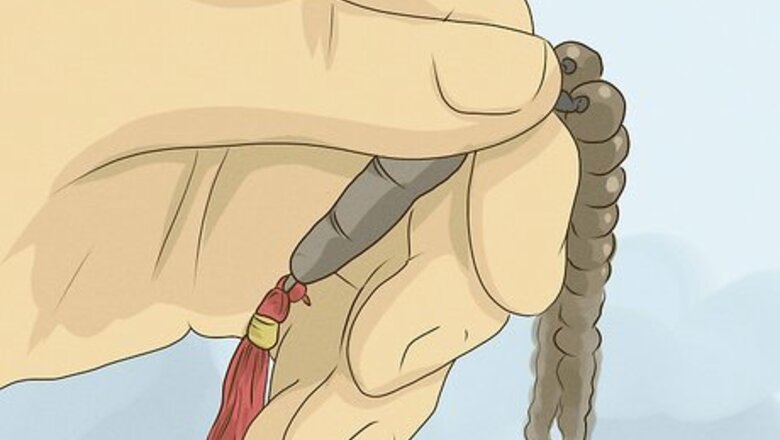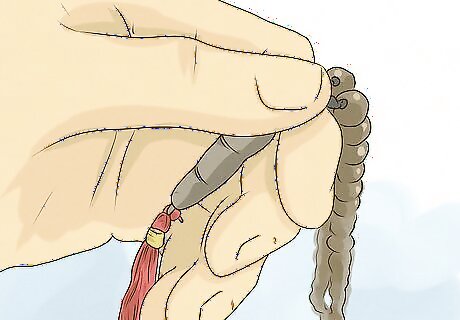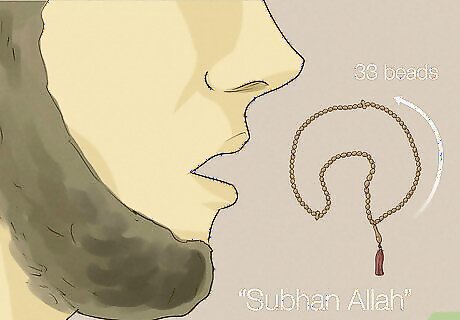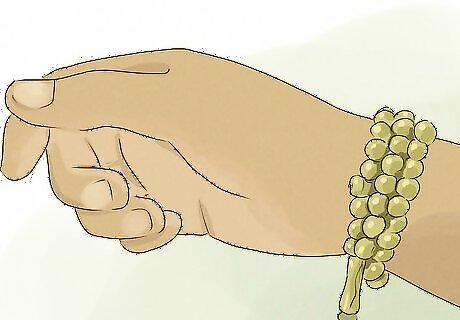
views
- Hold the tail of your misbaha between your thumb and forefinger. Then, while holding the first bead above the tail, say “Subhan Allah” (“Glory be to Allah”).
- Say “Subhan Allah” 32 more times, moving to the next bead each time you say it to help you count.
- Say “Alhamdulillah” (“All thanks to Allah”) 33 times, keeping count with the misbaha. Finish by saying “Allahu Akbar” (“Allah is the greatest”) 33 times.
Performing Dhikr with a Misbaha

Hold the misbaha above the tail between your thumb and index finger. Place your thumb and index finger just above the tail (at the start of the ring of beads). Let the tail drape down near your palm. Use whichever hand feels most comfortable for you, and focus your mind on Allah. The tail, or “Alif,” is the dangling section that is separate from the circular strand of 99 beads.

Repeat “Subhan Allah” once per bead, 33 times. “Subhan Allah” means “Glory be to Allah” and it’s meant to praise Allah for being above imperfection. Say the phrase aloud or in your mind while grasping the first bead above the tail of the misbaha between your thumb and index finger. Then, move your fingers to the next bead and repeat the phrase again. Continue this process until you’ve counted 33 beads total and repeated the phrase 33 times. Clear your mind and try to think of nothing but Allah as you recite this phrase. Many Muslims prefer to count Dhikr on their fingers if they don’t have a misbaha.

Say “Alhamdulillah” once for each of the next 33 beads. “Alhamdulillah” means “All thanks and praises be to Allah” and it’s a common prayer to express gratitude. Repeat the phrase 33 times while keeping count with beads. If your misbaha has divider beads between the 33 prayer beads, hold the divider bead after each set of prayers and use it as a moment to exhale and reorient your mind on Allah if it’s begun to drift.

Recite “Allahu Akbar” once for each of the last 33 beads. As the final stage of Dhikr, say or think “Allahu Akbar” each time your thumb passes over a bead, for a total of 33 times. “Allahu Akbar” means “Allah is the greatest” and is one of the most common phrases in all forms of Islamic prayer. If you like, add an additional “Allahu Akbar” to close your prayer session, as you would with other Muslim prayers.
Carrying and Storing a Misbaha

Wrap your misbaha around your wrist as a reminder to focus on Allah. Wear the misbaha on your wrist so you can take it off and use it for daily Islamic prayers or other spiritual rituals throughout the day. If you’re new to Islam, seeing your misbaha on your wrist acts as a reminder to praise Allah, or even just to ease the tensions in your mind. Keep in mind that the misbaha’s tail will hang down lower than the main strings of beads, so if you work with your hands (and get dirty while doing so), avoid wearing it on your wrist. If you’re not religious, you might still wear a misbaha as a calming or grounding object. Many Muslims use them as worry beads to help quiet their mind throughout the day.

Keep your misbaha in your pocket or car so you can use it any time. Keep your misbaha nearby so you can easily perform Dhikr or remind yourself to relax throughout your day. It’s common to dangle the beads from a rearview mirror—putting them there will remind you to slow down and stay present even when you’re sitting in traffic. Keeping your misbaha in your pocket is a great way to perform Dhikr discreetly while you’re waiting in line or just walking along the street.

Store your misbaha in a pouch or box at the end of the day. Store your misbaha in a special pouch or jewelry box so you know where it is when you start the new day (and your morning prayers, if applicable). A padded bag or box will also protect your misbaha from dust and moisture. That said, it’s important not to treat the beads themselves too reverently—most schools of Islam advise that you keep in mind that they’re simply a tool, not a sacred object or status symbol. Use a microfiber cloth to wipe down the beads if you notice any smudges or debris. Beads are made from all sorts of materials, like clay, wood, ivory, precious stones, or even coral. If your misbaha is made of delicate materials, store it where it won’t accidentally break, such as in a padded case.



















Comments
0 comment